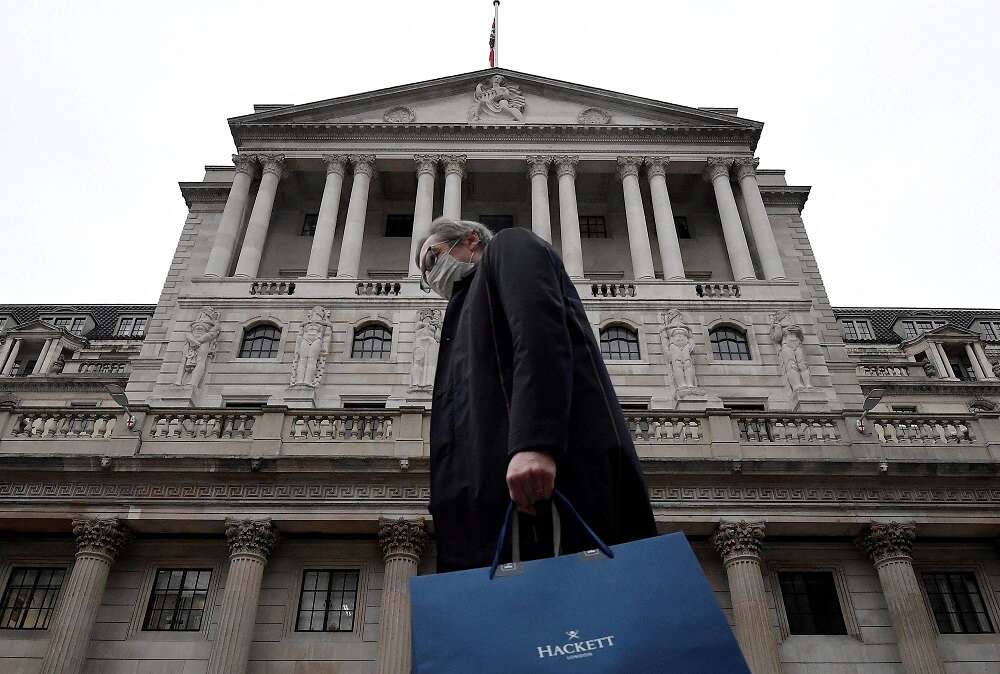
By David Milliken, William Schomberg and Andy Bruce
LONDON (Reuters) -The Bank of England sent a stark warning that Britain risks a double-whammy of a recession and inflation above 10% as it raised interest rates on Thursday to their highest since 2009, hiking by quarter of a percentage point to 1%.
The pound fell by more than a cent against the U.S. dollar to hit its lowest level since mid-2020, below $1.24, as the gloominess of the BoE’s new forecasts for the world’s fifth-largest economy caught investors by surprise.
They also trimmed bets on the central bank hiking rates aggressively this year. Short-dated British government bond yields slid sharply.
The BoE’s nine rate-setters voted 6-3 for the rise in Bank Rate from 0.75%, with Catherine Mann, Jonathan Haskel and Michael Saunders calling for a bigger increase to 1.25%.
Economists polled by Reuters had forecast an 8-1 vote to raise benchmark borrowing costs to 1%, with one policymaker opposing a hike.
Central banks are scrambling to cope with a surge in inflation that they described as transitory when it began with the post-pandemic reopening of the global economy, before Russia’s invasion of Ukraine sent energy prices spiralling.
The BoE said it was also worried about the impact of renewed COVID-19 lockdowns in China which threaten to hit supply chains again and add to inflation pressures.
But policymakers around the world are also trying to avoid sending their economies into a slump.
“It is a very weak projection, a very sharp slowdown,” BoE Governor Andrew Bailey told reporters.
“There’s a technical definition of a recession it doesn’t meet – but put that to one side – it is a very sharp slowdown in activity.”
On Wednesday, the U.S. Federal Reserve raised rates by a half-point to a range of 0.75-1.0%, its biggest increase since 2000. Chair Jay Powell said more such hikes were on the table.
But Powell said the U.S. economy was performing well, a contrast with Bailey’s more downbeat assessment.
The BoE’s rate rise was its fourth since December, the fastest pace of policy tightening in 25 years.
The BoE said most policymakers believed “some degree of further tightening in monetary policy may still be appropriate in the coming months”. It dropped the word “modest” to describe the scale of rate hikes ahead.
A split emerged, with two members saying the guidance was too strong given the risks to growth.
“The new forecasts, taken together with the increasing division among committee members, suggest the Bank is getting closer to a pause in its tightening cycle,” said ING economist James Smith.
Suren Thiru, head of economics at the British Chambers of Commerce, said the rate hike and deteriorating outlook would cause “considerable alarm among households and businesses”.
INFLATION TO TOP 10%
British consumer price inflation hit a 30-year high of 7% in March, more than triple the BoE’s 2% target, and the central bank revised up its forecasts for price growth to show it peaking above 10% in the last three months of this year.
It had previously predicted a peak of about 8% in April.
The BoE said British inflation would peak later than in other big advanced economies due to a cap on household energy tariffs. Fuel bills jumped by 54% in April and the BoE now sees a further 40% increase in October, hitting the economy.
Real post-tax household disposable income – a measure of living standards – is forecast to fall 1.75% this year, the biggest calendar-year drop since 2011 and the second-biggest since the BoE’s records began in the 1960s.
Voters in local government elections on Thursday are expected to punish Prime Minister Boris Johnson over the cost-of-living crisis and for breaking his own COVID lockdown rules.
Bailey said inflation would most hurt “those with least bargaining power and those who are often least well off”, describing that impact as “a great concern”.
The BoE kept its forecast for economic growth this year at 3.75%, but slashed its forecast for 2023 to show a contraction of 0.25% from a previous estimate of 1.25% growth. It cut its growth projection for 2024 to 0.25% from a previous 1.0%.
While growth in the first three months of this year has been stronger than the BoE predicted, it expects the economy to stagnate in the second quarter, due to an extra public holiday and reduced COVID testing. It sees a nearly 1% fall in GDP in the final quarter as the next energy price rise kicks in.
Those forecasts were based on bets in financial markets that the BoE would increase rates to about 2.5% by the middle of next year, which the central bank signalled was probably too much.
It said it expected inflation would fall to 1.3% in three years’ time, based on market pricing for interest rates, as higher unemployment and the cost-of-living squeeze hit the economy. That would be the biggest undershoot relative to its 2% target since the 2008-09 global financial crisis.
The BoE also said it would work on a plan to start selling the government bonds it has bought since that crisis, which currently stand at just under 850 billion pounds ($1.05 trillion).
BoE staff would update the Monetary Policy Committee on the plan at its August meeting which would “allow the Committee to make a decision at a subsequent meeting on whether to commence sales”.
($1 = 0.8067 pounds)
(Additional reporting by Andy Bruce Writing by William SchombergEditing by Catherine Evans)


